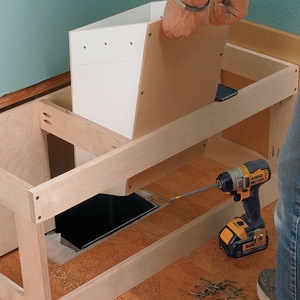Because of the spike in energy prices, I am getting alot of interest in customers replacing all the windows in their house. It used to be replacements were one at a time and I didn’t worry about deposits.
Now I am requiring special order items to be paid in advance before I order them. Its the only way I am going to do it.
Its going to be a tough sell for some of my customers.
When I get the deposit, I take it to the lumberyard. My plan was to have the yard mark the windows as paid for. Then I could go to the customer and reassure them their windows are taken care of.
The yard is certainly happy to take the money, but applies it to my account without designating any particular item as paid.
How can I handle this in a reassuring way for my customers?


















Replies
Write them a receipt. Say windows ordered and materials paid in full. They have to sue you if you run off with thier money not the lumberyard. If these are special orders that cannot be returned get full payment including your markup, if they can be returned with a restocking fee get enough to cover that and your time for dealing with it if they change their mind. I have heard that some states have laws regarding the amount of deposit. Dont know if that applies to materials or labor. Might check on that depending on where you are.
Yeah, I'm probably overthinking things. If everythings down in writing, they have plenty of ways to go after someone who takes the money and runs. I could point out I wouldn't do that because I could end up in handcuffs.
How about having the customer go and order and pay for the windows so that they are in the customers name? You would need to go with them to make sure all aspects of the order was done correctly of course.
Do you have written contracts with your customers?
If not, why not?
I do not believe a deposit is out of line for any type of remodeling work, you're not in the finance business. We require a deposit on any job we sell, even a small half day T&M job has a few hundred dollar deposit.
CAG
How do you guys handle it if say the windows for a job cost $10,000 and the total bid was for 13,500?
I did(many years ago) a window replacement once where that was the price of the windows and I believe that was close to the cost for the labor($3500).
When I told the guy that I wasnt going to bank the project he balked at giving me 10g's befor any work was done, having no pryor history with the guy it was a little tricky with the finances.
This particular job worked out though becuase I was doing a reroof, reside, and a large(2000sq ft deck) for him so I was sorta able to jugle the money around to handle it but I'm not sure what he'd/I'd of done if the window replacement was the only work. We did all the jobs as individual jobs. Pay for each as completed.
Doug
If that were the case I would require enough money to cover the cost of the window prior to ordering it. If the customer absolutely would not go for it, I would wish him luck and possibly refer him to someone else.
Our down payment amounts are broke out depending on job size,
small jobs 50% down, 50% on completion
Middle of the road are broken out in 1/3's
Larger jobs usually 5-6 payments based on mile stones with the last payment being around 5% of the total.
For example, most of our kitchens, end up around 23% down, 23% on start, 23% after cabs are installed, 23% on "substantial completion" and the remainder on final.
However, if for some reason, the cost of the cabinets is not covered by the downpayment I bump it up and then decrease the start payment a bit.
We also do quite a few 3-4 hour type T&M jobs for past clients are good referals, 9/10 I get a deposit of a few hundred for.
Real good past customers can call with a small job and I'll schedule with out anything signed or money down, but that is very rare.
How do you guys handle it if say the windows for a job cost $10,000 and the total bid was for 13,500?
At first I was hesitant to asking for material costs up front, or payment anytime other than at the end, but working on tight margins with T&M jobs, small losses make a huge impact on profitability.
Now I don't even negotiate--it's 100% of the cost of materials up front and weekly payments for all time and misc. expenses up to that point. Larger jobs, say longer than a month or so, are simply broken down into smaller material purchases.
Clients that pay promptly are given a little more slack and I'll often pick up materials without prepayment, at my discression, but it's always expected to be paid in full at the end of the week.
I use a contract that spells out the scope of work, materials that will be ordered including the costs, and how the whole process will work. With this the client at least has the reassurance of the contract, not that a contract would protect them from a real crook.
If your client balks at paying up front for the entire window package, you could suggest breaking the job into two parts and if they like your installation of the first set of windows you'll be glad to order and install the others. This can be a powerful way to develop trust.
It does require more time on your part, which you should be paid for, so it costs a little more money, but there is half the risk for the client and it just added a few extra billable hours to the calender.
One GC's client broke his $1m vacation home (on 5,700 acres!) into a series of projects that started very small with a simple outhouse. Next, was a stable/bunk house with no water or electricity. Then, a garage/guesthouse. Finally, the main house was built. If that contractor was a little sharper, it could have been his golden goose, but unfortunately, he couldn't turn it into a foot in the door for that market, but it was darn good while it lasted.
There are other ways to protect the client (bonds, escrow, etc.), but I simply say that if my record with past clients isn't good enough that they are probably better off with someone they have more trust in.
If you leave town without paying the complete lumberyard bill, clients are at risk of having their homes liened by the lumberyard if their window payments are simply being applied to your oldest outstanding purchases. Many lumber yards allow cash tickets to be used where specific purchases are paid for over the counter, but your normal discounts and account priviledges are used. Maybe that wouldn't make a difference if the accounting system doesn't differentiate cash tickets from simple payments, but it might be worth looking into.
Good building
Every job is written out as to scope of work, payment etc. I need to quit procrastinating and get a formal contract form made up and reviewed by a lawyer. I see you are from Kansas. Do you know of any laws here that deal with deposits?
I do not know of any laws, not to say there are not any.
I'm employeed rather then self-employed, so I never really looked into it. Though the boss has never mentioned anything.
Thanks. I appreciate you sharing how you do this. Tells me I am not out of line with asking for money down.
I do not think there is anything wrong with requiring a deposit. It's good business, and you should do everything you can to keep yourself ahead of the client so if things go south, you're covered.
If someone want's on our schedule it requires money down.
"The yard is certainly happy to take the money, but applies it to my account without designating any particular item as paid."
Uhhh .... tell them "don't put this on my account ... here's the cash"
seems pretty simple to me?
anyways ... I don't and have never paid for special order materials out of my own pocket. I get the full amount before I place the order. If they don't trust me enough to buy their own stuff ... how can I trust them to actually pay me in the end!
then again ... I don't pay up front for non-special order stuff either ...
and I usually get a start check that covers some of the labor too ...
all before anything is done/ordered/started.
maybe I just have an honest face?
most liekly because I won't start till I get what we contracted for ... and it's all there in black and white. They sign ... I sign ... and we continue. I leave the big meeting with a coupla signatures and a check.
Jeff
Buck Construction
Artistry In Carpentry
Pittsburgh Pa
Surely when you place the order with the supply house, they give you a receipt showing exactly was ordered and the amount of the deposit.
"When asked if you can do something, tell'em "Why certainly I can", then get busy and find a way to do it." T. Roosevelt
on the other hand it's really none of the customers concern how much you are paying for material.
It's a package price, they either agree to the price or they do not.
Right, but you could white out the price and show them that the items had been ordered. Also depends on your relationship with the customer.
"When asked if you can do something, tell'em "Why certainly I can", then get busy and find a way to do it." T. Roosevelt
"on the other hand it's really none of the customers concern how much you are paying for material. "
In some instances it might be. We have a choice on itemizing deductions: we either take the usual, or we can apply sales tax towards the deduction. In years with big ticket purchases like that, the amount paid for materials is relevant indeed.
You would only be able to claim the sales tax if you paid the vendor directly for the materials. If you pay the contractor then he pays the vendor you could not take a deduction for those sales taxes.
Your looking at this from a HO view though. I would never tell a customer what I'm paying for the material that I use, it's simply none of there business. I have to assume responsibility for the stuff and I intend to be compensated for that risk, that's something some HO don't see so I make it "invisible" for them.
I say that but I'm sure there are contractors that do allow the HO to purchase items and that would be OK if that's there agreement.
If a HO wants to buy something for me to install the first thing I do is get out a form and have them sign off on it stating that I will do my best to make it work, if it doesn't I still get paid for my time(and all of it), PERIOD. I'm not going to do free work for a HO because they didn't have the ability to get the right product, I get plenty of opportunity to do that on my own!
Doug
Edited 6/23/2006 6:56 pm ET by DougU
My only experience with a GC is a time and materials job - as such he provided the materials (and labor) cost in order for him to add his percentage.
I didn't know about the need to pay the vendor directly for sales tax, but it was never really an issue with me because my regular deductions exceed anything I'd get for sales tax. If I were buying $50K kitchen cabinets, it WOULD be an issue for me and I'd hope the GC would work with me to allow me to pay the sales tax directly, particularly if his discount wasn't enough savings to offset it. And yes, I think the HO is entitled to know the retail materials cost, even if the actual cost to the contractor is "none of their business". It is the HO money being spent, after all.
Case in point: my T&M job. We picked out a tile that we liked which happened to be on sale at the place we picked it. The GC's tile guy did not have the tile on sale and the cost of the tile was several times more not including install. Plus we paid the T&M % over. How is that waste of my money none of my business?
Aimless
I think we are talking two different type contracts.
If I contract with you to do that kitchen for x amount of money and you except then what would it matter what I paid for the cabinets? Or how much I made?
Your talking a T & M job and obviously if you are giving the GC his/her material cost plus mark-up then of course you would rather pay 10-20% on tile that cost perhaps $1000 as opposed to the same tile that cost $1400.
Believe me I know full well the need to watch how much we/you spend on our houses, I don't have unlimited money as I assume you don't either, and if I'm wrong on that could you please float me a loan!
Doug
I get a receipt showing the amount charged to my account. My monthly statement reflects payments and charges.The yard owner doesn't want to designate a payment for a certain item and rightfully so. I would guess he doesn't want to get in the middle of anything.
I take credit cards. I'm protected, the customer is protected. And the bank fees for processng are not that bad.
It's usually just squirelly new customers that have a hard time with deposits, using their credit card puts them at ease.
-Norm
Not a bad idea. How did you get set up?
I just asked my bank about it. They had a CC processing company they recommended. The set-up fee was under a $100 - that included the knucklebuster CC slide machine and a bunch of blank forms. I just call in the transaction for approval, I can do it on my cell right from the customers driveway if need be. The monthly fee is $10 and then a 2-3% transaction fee depending on type of CC they use. The payment is credited to my checking account within 24 hours.
No running to the bank, waiting for the check to clear, chasing bad checks...and it's a good marketing point too, one more thing to set me apart from the competition.
-Norm
This is how I do it:
ALL Custom Orders MUST be paid for in full, prior to materials being ordered. This includes payment for my time to create the order (site visits, calculations, phone time, etc) and my O&P.
If the Special Order is out of scale with the job total as it was in your $10K/ 3.5K example, the paid in full rule remains in effect. However, if they are uneasy putting up that kind of cash I explain that I am too - especially since it is not even for my house. Then I offer to create the order with my supplier and they could pay for it, directly to the supplier, using their cc. I add that this way they could get the miles/ points on their card. With that, they usually jump at the opportunity.
I do not tell them about my time and O&P structure. This is folded into the labor portion of the job and I get a deposit equal to or more than that amount to reserve/ schedule time for them.
Many clients are happy with this arrangement. If they aren't - Beware. it's a sign of how they will treat you in the future. Each of you is establishing precidents. Make it clear that you are honest and sympathetic to their needs - but you are not a putz, you are a businessman.
Frankie
Exasperate your vegetables until exhausted; disturb your chestnuts in milk until queasy, then disappoint.
Arabella Weir as Minty Marchmont - Posh Nosh
Thanks, I'll see if my yard will work something out with the credit card.